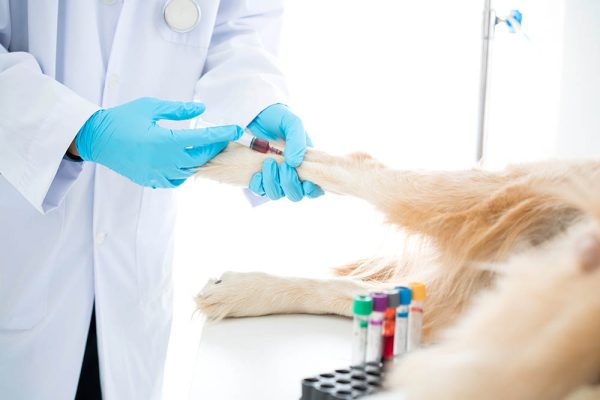In this article
Many people know someone who suffers from a cat allergy. Despite their uncomfortable symptoms, many allergic pet owners choose to still live with their feline companions. We often associate a cat allergy with humans, but many people will be surprised to learn that dogs can also be allergic to cats.
While cat allergies are not as common in dogs as in people, some dogs do develop allergic signs after being in close contact with cats.

Yes, Dogs Can Be Allergic to Cats!
Allergies occur when the immune system overreacts to an allergen, causing various clinical signs. Like humans, dogs can develop allergies to different substances, including cat dander. While some dogs can be allergic to cat dander, it is important to note that most dog allergies are more commonly associated with other environmental allergens such as pollen, grasses, molds, house dust mites, and fleas.

What Are the Signs of Allergies in Dogs?
If you suspect that your dog may be allergic to cats or another type of allergen, there are several signs to look out for. A classic allergy symptom is itchy skin, which can lead to excessive licking, scratching, and chewing.
- Hives
- Recurring ear infections
- Respiratory symptoms like coughing, sneezing, runny nose, and red, puffy, watery eyes
Food allergies can also present with these signs. Sometimes dogs with a food allergy also experience gastrointestinal upset, like vomiting and diarrhea.
If left untreated, these signs can lead to other health issues like secondary infections that can be uncomfortable or even painful for your pet. Identifying a dog’s specific allergy can be challenging, especially since dogs can be allergic to a variety of substances, both in their environment and in the food they eat.
If you suspect your dog is suffering from allergies, are concerned for their wellbeing, or simply want more information on their health, you should contact your vet directly for an assessment. They can provide you with more information and a care plan.
If you need to speak with a vet but can't get to one, head over to PangoVet. It's our online service where you can talk to a vet online and get the advice you need for your pet — all at an affordable price!
How Can I Tell if My Dog Is Allergic to Cats?
If your dog starts showing any of the classic allergy signs mentioned above, it’s important to consult your veterinarian to identify any underlying causes. Your vet may recommend a test to identify potential allergies and rule out other conditions that may present with similar signs.
One common test used to diagnose allergies in dogs is called an intradermal skin test. This special test is similar to what is done in human medicine and is usually performed by a veterinary dermatology specialist. It involves injecting a small amount of the allergen under your dog’s skin and monitoring for reaction.
Another diagnostic option is a blood test, which can identify the specific allergen causing your dog’s clinical signs. Since many blood tests available today are not considered very reliable, it is best to consult a veterinary professional for advice on the best options for allergy testing.
Once your dog’s allergies have been identified, your veterinarian can help you develop a treatment plan to manage their signs and improve their overall quality of life.

What Should I Do if My Dog Is Allergic to Cats?
If your dog is diagnosed with a cat allergy, your vet may prescribe medications like antihistamines, steroids, or other allergy medications to manage your dog’s itching, licking, and chewing. Routine bathing with medicated shampoos can also help to minimize allergen exposure and soothe itchy or inflamed skin.
If you suspect your dog may be allergic to the cat in your home, try to keep the two animals separated as much as possible. Vacuuming regularly and using air purifiers with a HEPA filter to filter out allergens are important prevention strategies for managing your dog’s allergy. Removing soft surfaces like carpets and rugs where cat dander can accumulate can also reduce the allergen exposure for your dog.


Final Thoughts
Even though cat allergies are far less common than other environmental allergies in dogs, it’s important to seek help from a veterinarian if you suspect your dog has any sort of allergy. With a proper evaluation, care, and environmental adjustments at home, your dog should be able to live with their cat allergy with minimal discomfort.
Featured Image Credit: Olesya Kuznetsova, Shutterstock




















